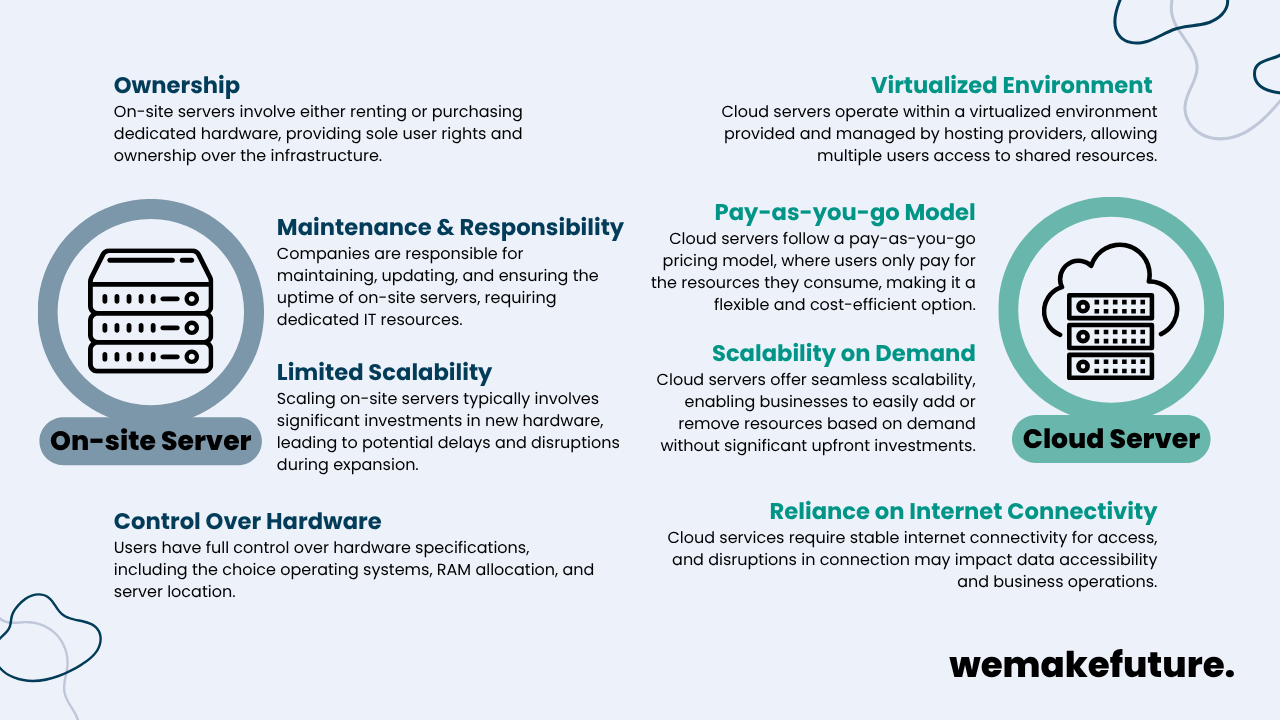
While companies extend, the question of IT infrastructure arises more and more often. This decision is not about the present state only but also involves forecasting the future scalability. However, before choosing the type of hosting it is crucial to have in mind the difference between on-site servers, which is called traditional hosting, and cloud hosting. Although each offer assists in this fundamental goal, they go about it differently.
With on-site servers, computing operations are actually performed by specialized, dedicated hardware, which may be owned or leased. In contrast, the cloud hosting solution consists of a network of these servers that is accessed via end devices to provide the computing power including storage and software. Yet, the difference between them goes beyond their basic functions covering among other things such as availability, scalability, security, costs and controls. At the end of the day, the decision of whether to go for the cloud or on-site servers will be determined by the ability to balance efficiency, security and scalability considering the present needs of the organization and its future growth projection.

On-site servers consist of buying dedicated hardware either through rental or purchase which means that such servers are available to one user only. This model suits large enterprises with strict security needs or a large number of servers which resemble tech giants like Google or companies with databases and big data platforms. Nevertheless, the ongoing work of server uptime, updates and maintenance is a resource-consuming activity that requires in-house maintenance IT department.
However, this setup becomes very transparent, and the consumers have the freedom regarding the choice of the operating systems and also can carry out the steps like buying, renting and allocating the RAM (both established or new methods) by them. Now, this type of infrastructure sees scaling beyond individual servers where clusters of multiple dedicated servers provide an upgraded computing power, hence the advancement of the next level of scalability.
On-site servers serve as the most ideal option for companies
Unlike traditional on-site servers that are hosted on dedicated physical hardware, cloud servers are a computing environment that is provided and managed by hosting providers. This scheme enables multiple users, including individuals and businesses, to get access to the servers within a virtualized platform. This virtual server system comprises virtual machines that store data and host services, as well as physical machines that manage virtual instances by providing a scalable amount of processing power.
Usually, cloud hosting providers would define the hardware system specs for the sake of maximizing the economic performance and providing their users with more cost-effective solutions. This type of infrastructure enables a lower unit cost which is because users only pay for those portions of the system with which they use. Moreover, cloud circuits eliminate the need for applying internal resources for maintenance and renovation; instead, these options become available for you in accordance with your business plans. This flexibility to the demands and magnitude makes the cloud servers an option to choose for businesses looking for scalable IT services.
The term "cloud" has become established not only in the field of server hosting. There is cloud software, cloud computing or even cloud providers. All these terms have in common that they refer to a server that is publicly accessible and used. In cloud computing, for example, servers are connected to each other and share the computing power of individual tasks. This increases the capacity enormously and the workload is distributed over many, smaller computers. Cloud-based services are completely different. From web hosting to file hosting (Google Drive or Dropbox) to cloud automation(Zapier or Make), there are countless ways to use this technology.
Ideal for
The list of disadvantages of cloud hosting is so short because there are only a few in this comparison, especially for SMEs. The application examples of a dedicated server show that this form of hosting only has clear advantages for a few, very specific requirements. Moreover, the advantages of dedicated servers such as control and exclusive user rights are probably of little relevance to most companies. Because let's face it, it most likely doesn't matter at all whether other people and companies are using the same hardware as you. When it comes to their own IT infrastructure, most companies are probably more interested in keeping costs manageable and still using a stable and high-performance server.
Coupled with the significantly higher flexibility and scalability, the cloud server wins in our eyes across the board. Since data security (of course) also enjoys the highest priority with cloud hosting and downtimes do not represent such a large and time-consuming loss as with dedicated servers, we recommend this model to all our customers. Especially against the background of cloud automation, cloud servers (as the name suggests) are indispensable. We are happy to support you in the analysis and subsequent automation of business processes, explain possibilities and individually address the company processes. Arrange a free appointment!
Stay up-to-date with us.